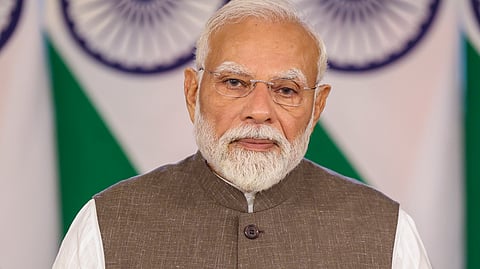

NEW DELHI: Prime Minister Narendra Modi said that India has established a tsunami warning system that benefits as many as 29 countries.
He outlined nearly five key global priorities to strengthen Disaster Resilience, stressing that ‘strengthening early warning systems and coordination’ is very much crucial.
The Prime Minister also advocated that a global digital repository of the practices followed post-disasters would be beneficial for the entire world.
Addressing the International Conference on Disaster Resilient Infrastructure (ICDRI)-2025 through videoconferencing on Saturday, PM Modi welcomed the participants to the International Conference on Disaster Resilient Infrastructure 2025, marking its first-ever hosting in Europe and expressed gratitude to the President of France, H.E. Mr. Emmanuel Macron and the Government of France for their support in organizing the event.
Notably, Union Minister for Earth Science, Dr Jitendra Singh has gone to France to attend the United Nations Oceans Conference themed on ‘Shaping a Resilient Future for Coastal Regions'.
Underscoring the vulnerability of coastal regions and islands to natural disasters and climate change, PM Modi cited recent disasters, including Cyclone Remal in India and Bangladesh, Hurricane Beryl in the Caribbean, Typhoon Yagi in South-east Asia, Hurricane Helene in the United States, Typhoon Usagi in the Philippines, and Cyclone Chido in parts of Africa.
He cited as how these disasters had caused significant damage to lives and property, reinforcing the need for resilient infrastructure and proactive disaster management.
Recalling India's past experiences with devastating disasters, including the super-cyclone of 1999 and the tsunami of 2004, the Prime Minister emphasised how India adapted and rebuilt with resilience, constructing cyclone shelters across vulnerable areas and contributing to the establishment of a tsunami warning system benefiting 29 countries.
Underlining the Coalition for Disaster Resilient Infrastructure’s (CDRI) ongoing work with 25 Small Island Developing States to build resilient homes, hospitals, schools, energy systems, water security measures, and early warning systems, PM Modi expressed his appreciation for the presence of representatives from the Pacific Indian Ocean, and Caribbean regions, and welcomed the African Union’s participation in the coalition.
PM dwelt upon the five key global priorities and topics, including the importance of integrating disaster resilience courses, modules, and skill development programs into higher education to build a skilled workforce equipped to tackle future challenges.
The PM, as one of the five topics, also stressed the need for a global digital repository to document best practices and learning from countries that have faced disasters and rebuilt with resilience.
The PM also reaffirmed India's recognition of Small Island Developing States as Large Ocean Countries and emphasised the need for special attention to their vulnerabilities.
As the fifth key priority, Modi highlighted the necessity of strengthening early warning systems and coordination, noting their critical role in facilitating timely decision-making and effective last-mile communication.
The Prime Minister called for the construction of infrastructure that remains steadfast against time and tide, emphasising the need for resilience in development. He also urged for global efforts to build a strong and disaster-resilient future for the world.